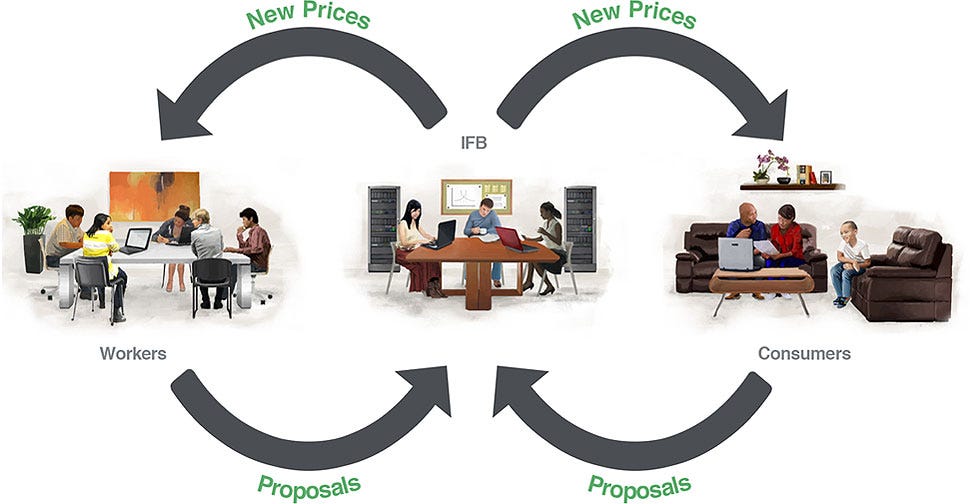
This is the 5th installment of the “Socialist Policy Critiques” where I dig a bit deeper into socialist policies and their effectiveness both in the past and present. If you wish to see any of these past posts, you can view them here. Also, help keep this project going by becoming a patron at patreon.com/ForwardBlog
The Set Up
Capitalism is failing right before our very own eyes. We see it most clearly in America where the state structures and services offered have been stripped bare and have exposed the rot in the system. This is an economic system that most of the western world follows. But the difference between America and those in western Europe, is that they’re provided an actual social safety net, whereas Americans are allowed to lose their jobs, healthcare and livelihood in the midst of a global pandemic. Crises always breeds outrage and risks exposing the underlying problems of any economic system. The state is only as powerful as its weakest links. However, with globalized trade and the international elite class that benefits from it, they don’t feel that way. But with this recent crisis, the bailout by the Trump administration, the donor class in America in particular, has signaled that securing that last robbery was more important than supporting the state and making sure Americans don’t fall into poverty and despair. Is it because they have seen the writing on the wall for a long time now? Most likely. Even the most mainstream economists (Krugman, Piketty etc.) would tell you that this neoliberal economic system was unsustainable. With the top 1% already owning more than 40% of the country’s wealth, by 2050 they would own about 60% which is unheard of and quite frankly scary. So what will the next ten years look like in America and the west? Will wee see the workplace reimagined, more cooperatives or enhanced social safety net measures? Or will we see a dystopian nightmare and possible internal conflict led by business tycoons as they try and secure their stranglehold on power? I believe we will see a post-capitalist future at some point because this model cannot hold up under external economic and social pressures. A new generation doesn’t cringe at the buzzwords like socialism and anarchism. They embrace them and work with other organizations in order to further those agendas. In fact, a recent poll conducted by Monmouth University showed that 54% of Americans were in favor of burning down the Minneapolis police station. You would never have seen a poll like that ten years ago. It indicates what we have known all along, that millennials and even Gen X’ers are sick of this capitalist system. It is exploitative by nature and Marx warned everyone of this dynamic almost 200 years ago.

What is Post-Capitalism?
The term “post-capitalism” may seem scary to those who don’t dabble in political science and economic theory. Post-capitalism is simply the state in which the economic systems of the world can no longer be described as forms of capitalism. Marxists have always argued about post-capitalism and what it entails. Most argue that a post-capitalist society may come about as a result of spontaneous evolution as the modes of production within capitalism, become obsolete. This can occur either through the maxing out of labor power or a world conflict that spirals out of control and leads to the economic immiseration of millions. We aren’t far from that second scenario as we are currently going through a global pandemic that has wreaked havoc on the world’s supply chains. Additionally, about 60 million people are expected to fall into extreme poverty, according the World Bank report of 2020. After the recession of 2008, 13% of the world’s global production and 20% of global trade. If 2008 wasn’t a good enough warning sign, 2020 certainly should have been. Many economists believe that 2008 was the first major sign that capitalism was failing and that American-styled crony capitalism was damaging the world. As this economic breakdown occurs, a vacuum is created for what will ultimately fill it. Marxists have argued for straight socialism, whereas followers of the economist Peter Drucker, argue that it will first be a post-capitalist society that’s not as radical. For Drucker, he outlines a world in which the classes would be divided between service workers (even though the book was written in 1993, this would include the Gig economy) and knowledge workers. This would be in contrast to the capitalists and the proletarians you see in the capitalist model. Funny enough, Drucker predicted that we would begin to see this post-capitalist world form in the years of 2010-2020. Drucker is clearly not that far off with his predictions. To make this possible, knowledge and not capital or land accumulation will be the new basis of wealth. Much of this assuming that wealth gets redistributed in some large-scale fashion (which we have yet to see). Another economist who argues in favor of post-capitalism, is Paul Mason. Mason is a British commentator and oddly, not an economist. This is rare considering those who mainly support a post-capitalist economic model are generally economists. However, post-capitalism is more of an end result than a theory. In a general sense, post-capitalism is the result of an accumulation of all the bad parts of capitalism finally giving way to a better future. Mason agrees with men like Drucker before him. His argument is more basic in which he says the income inequality, repeating/never ending boom and bust cycles and the damage capitalism has done to our environment, has led people to consider how a post-capitalist society would look and function. With automation increasing and cheap labor being outsourced more so than ever, it’s important to understand how a new society needs to form. Monopolization of basic goods and services will only lead to more poverty as the globalized system of trade grinds to a halt.

A Participatory Economy
The two most likely new systems that will develop in a post-capitalist society are a participatory economy and socialism. In a participatory economy, one might see a Green New Deal pass and a large package of policies that directly address both climate change and financial crises. This model in a sense is less radical than socialism. It assumes that labor power is not strong enough to reverse the modes of production and that a remnant of the capitalist hierarchy would still be intact. One great thing that would come out of a participatory economy is a form of direct democracy. This is also an end result in which “voting by the population” controls the levers of power and not the donor class. In this system, there would be no donor class and the direct democracy can provide things like increased transportation budgets, new residential zones and recreational areas as well as a single-payer modeled healthcare system. For those that think this sounds like socialism, it is in a sense. But it doesn’t quite go all the way there. In fact, may economists think that participatory economies will most easily lead to a full socialist model. It may be easier to get the populace to accept this model since there is still a stigma behind the word “socialism.”

Socialism
The other system that could develop out of the fall of capitalism is socialism. This is the end result for any Marxist worth his salt. It’s a more radical version of participatory economies, because it reinvents the workplace, creates cooperative ownership of the means of production and eliminates labor time to fit the use-value model. It’s the utopian socialist version that most clearly aligns with a post-capitalist world. Robert Owen, the Dutch utopian socialist who built his community of New Harmony, Indiana first outlined this possibility over 200 years ago. Many early socialists like Marx and Owen, realized that capitalism would max out its potential eventually. The surplus value of labor would not continue without revolts and anger towards the system. Marx realized himself, that capitalism breeds conflict between the stratified classes. Because the system is inherently inegalitarian, the capitalist class would always have the advantage and be able to use force if necessary. We saw this dynamic play out with the labor strikes and revolts throughout much of the latter 19th century. Security agencies, like the Pinkertons were used to destroy unions and sometimes kill their leaders. If there was ever a sign of what capitalism would entail, its the brute violence thrusted upon the largely immigrant workforces of the late 19th and early 20th centuries. With the economic system of socialism comes a wide arrange of ways in which to approach that model. There is market socialism which is based on socialization and cooperative ownership of the means of production but retains monetary calculation and market competition. There’s also planned socialism where some forms of economic planning substitutes markets for allocating the factors of production (we see this most clearly on display with the Chinese and how they centrally plan their housing so nobody is homeless). Last but not least, there’s communalism. This is an individualist form of anarchism first theorized by Murray Bookchin and his libertarian anarchist leanings. Nobody knows what socialism can bring to a post-capitalist would but we are getting closer to finding out.

The End Game?
As we’ve seen, it’s simply not enough to reinvent workspaces and go to a 4 day work week. These are reforms on the edges of capitalism and are no longer sufficient for a new generation. Millennials in particular, are the most informed and educated generation but have seen the worst of the capitalist system on display. Two recessions in just the past ten years, have spoiled any chances of maintaining this system. The Occupy movement of 2011 was just the start of a global awareness that the capitalist system is failing. With the recent CARES Act bailout of 2020, the Trump administration decided not to put in any economic stabilizers and only wrote one $1,500 check to Americans as a way to shut them up. The lack of economic stabilizers in the bill, indicates to me that the donor class (in American in particular) knew this was their last great heist. Two massive bailouts in just ten years while 45 million are currently unemployed, is a sick end result to 300 years of capitalism. And if that wasn’t enough to indicate the system needed to change, the record gains for the stock market in the month of May should tell you. Has there ever been a clearer dichotomy of what capitalism represents than record stock market numbers amidst a global pandemic where the government just juiced the Federal Reserve with $4 trillion, while 45 million are unemployed, 20 million lost their employer-based healthcare and another 110,000 have died from this virus? Of course the capitalists won’t just give away their gains. Of course they won’t let this system die without a fight. But we no longer have to wait for their handouts. The time is coming and nobody knows whether it’ll bring violence or not. The country is hyper-partisan on a good day, much less the last four years of incredible partisan divide. So much so that almost half the country believes wearing a mask during a pandemic, makes you lack machismo. Some have theorized that this will lead to a second civil war. I doubt that will happen because there isn’t enough social cohesion and a leading ideology to start a civil war. Also, during the Antebellum era, the south had by far the most millionaires and thus had the need to continue the exploitative capitalist system of slavery. Now America has almost too many millionaires to count and they don’t rely on slavery to make their money. Plus, we have seen an increased awareness to others’ precariousness because everyones material needs have been greatly affected during this pandemic. This indicates a growing awareness of class solidarity and that’s the last thing the American capitalist class wants to see. But there’s no doubt in my mind that the capitalist class will intentionally try to divide us along racial lines as they have always done. These protests over the death of George Floyd and system police brutality, are an example of a populace fed up with system. it’s also indicative of an administration on it’s dying breath, trying to drive a wedge in between us by using race as the playing card. Will it work? Maybe. But what’s most important is what economic system we can build that creates an egalitarian lifestyle and one in which your labor doesn’t dictate your worth. We’re not "human capital stock", we’re human beings and we deserve better.



